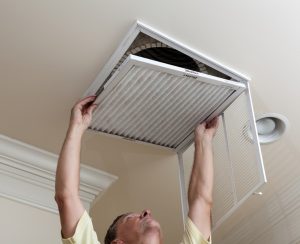 When an air conditioner won’t work properly, people often assume what they know to be common air conditioning problems. They may ask us, “Does it just need more refrigerant?” Or, “Is the thermostat broken?” We should let you know, before we move on, that while refrigerant leaks are common, simply refilling the refrigerant is rarely a solution. You must seal the leaks, too.
When an air conditioner won’t work properly, people often assume what they know to be common air conditioning problems. They may ask us, “Does it just need more refrigerant?” Or, “Is the thermostat broken?” We should let you know, before we move on, that while refrigerant leaks are common, simply refilling the refrigerant is rarely a solution. You must seal the leaks, too.
Otherwise, the thermostat is rarely the problem when the air conditioner completely struggles to run as intended, and we must look to components inside the system. We may have to do a bit of detective work to determine what went wrong, and often we find it’s the same culprit: the air filter.
“I thought the air filter just cleaned the air!”
It does! The air filter should be able to filter many of the particles known to cause allergies and asthma. For the best air quality, though, you may want to upgrade to an additional air filtration or air purification system, as filters may not be powerful enough.
That’s because, while they do filter the air somewhat, they are designed to do much more. They protect your AC system from damage! If debris were able to get sucked up by your blower fan, it could hit the indoor unit, causing permanent damage to the components. The filter helps avoid this.
“What went wrong?”
A dirty filter can still stop particulates from pummeling your air conditioner, but it also stops air from passing through into the system. Your air conditioner must suck in air before cooling and redistributing it, so a blocked filter will cause a lot of trouble. Low airflow means you feel uncomfortable, but it also damages the AC system.
“How does it damage my air conditioner?”
A dirty air filter can damage your air conditioner in a number of ways, not to mention how much it raises your energy bills with all the extra work it takes on. Because the fan motor is working a lot harder than it should have to, the motor can wear out quickly and require replacement—all because of a dirty filter.
In addition, the lack of warm air coming into the system means the evaporator coil may freeze. You may think frozen coils are a common thing to see in air conditioners, but this is not normal. It means your air conditioner is not absorbing as much heat as it’s designed for, which results in quite a bit of wear and tear.
“How often should I change the air filter?”
What should you take away from all of this? It’s so important to change your filter every 1–3 months. This range depends on usage and whether or not people in your home have allergies or asthma: they may need you to change the filter more often. If you have a reusable filter, be sure to vacuum and wash it every few months, but let it dry completely before replacing it in the AC system.
For air conditioning repair in Tampa, FL, contact our team at The A/C Guy of Tampa Bay Inc.

